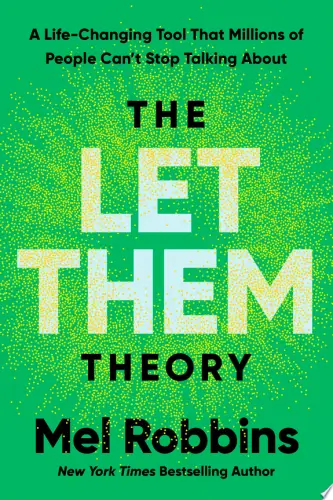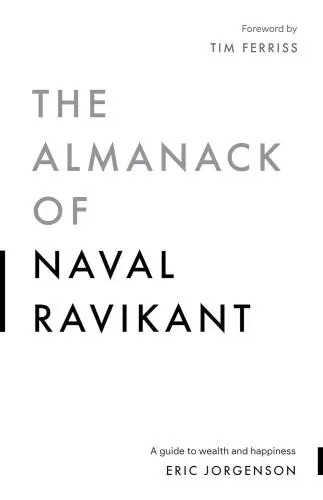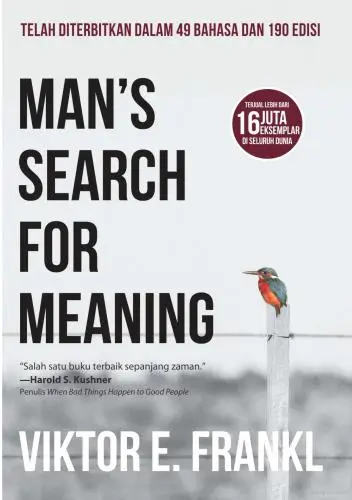Man's Search for Meaning
What's it about?
Man's Search for Meaning is a powerful account of Viktor Frankl's experiences in Nazi concentration camps and his development of logotherapy. It explores the human capacity to find meaning and purpose even in the most extreme suffering, offering profound insights into resilience and mental strength.
About the Author
Viktor E. Frankl was an Austrian neurologist, psychiatrist, and Holocaust survivor who is best known for his influential work "Man's Search for Meaning." His writing style is introspective and philosophical, often exploring the human capacity for resilience and finding meaning in the face of suffering. Frankl's unique perspective as a Holocaust survivor offers profound insights into the human condition, making his work a must-read for anyone seeking a deeper understanding of the human spirit.
8 Key Ideas of Man's Search for Meaning
- The Essence of Existential Analysis
- The Spiritual Unconscious
- Existential Analysis of Conscience
- Existential Analysis of Dreams
- The Transcendent Quality of Conscience
- Unconscious Religiousness
- Psychotherapy and Theology
- New Research in Logotherapy circa 1975
Existential analysis is a profound exploration into the human condition, focusing on responsibility as the cornerstone of our existence. This approach diverges sharply from Freudian psychoanalysis, which tends to view humans through a lens of objectivity and mechanistic processes. Instead, existential analysis posits that responsibility isn't just an aspect but the very essence of what it means to be human.
This perspective sees psychological phenomena not as byproducts of instinctual drives but as manifestations rooted in our autonomy and spiritual nature. It's about recognizing that we are not mere cogs in a machine driven by unconscious impulses; rather, we are beings capable of self-determination and moral agency.
Unpacking Psychotherapy Virtues
In this realm where psychology meets philosophy, three virtues stand out—objectivity, courage, and sense of responsibility—each aligning with different therapeutic schools born from Vienna's intellectual landscape:
- Adlerian psychology champions courage, urging individuals to confront feelings of inferiority head-on.
- Freudian psychoanalysis prioritizes objectivity, yet sometimes at the cost turning people into objects themselves—a process known as reification.
- Existential analysis elevates responsibility above all else.
Psychoanalytic traditions often dissect human behavior into discrete parts or drives while operating within frameworks like instinctual energism or emotional dynamism. In contrast, existential analysis seeks to weave these fragments back together under the banner of personal accountability.
Tactics for Embracing Responsibility
To truly grasp responsibleness—the heartbeats at the center of existential analysis—one must adopt several tactics:
- Recognize Responsibleness as Essence. Understanding oneself through responsibleness offers a new vantage point where actions and decisions reflect personal accountability rather than deterministic forces.
- Focus on Concrete Actions. By engaging "in action," one can tangibly shape their life narrative through deliberate choices instead dwelling solely on abstract concepts or theories.
- Emphasize Autonomy over Mechanisms. Acknowledging individual autonomy counters traditional views that reduce humans to mechanisms devoid personal agency—an empowering shift towards holistic understanding.
- Promote Awareness Through Logotherapy. Logotherapy extends beyond instincts to embrace spirituality or existential dimensions within us all—it’s about finding meaning amidst life’s challenges.
- Encourage Responsibility Ad Personam Plus Ad Situationem. Responsibility doesn’t exist in isolation; it intertwines with situational contexts highlighting how actions resonate within specific environments and circumstances.
- Challenge Atomistic Views Through Existential Analysis. Moving away from atomistic perspectives allows for greater self-awareness transcending basic drives towards embracing broader notions such as self-consciousness and values-based living.
- Shift Focus From Instincts To Self-Consciousness. Fostering self-consciousness provides room for introspection regarding one's role in crafting their destiny based upon deeply held values—not merely responding reflexively to primal urges.
Through these strategies, existential analysis invites us on a journey toward deeper understanding—a path lined with questions about who we are and why we make the choices we do—all underpinned by our inherent capacity for responsibility.
Key Examples/Data
- Adlerian Psychology and Courage: Adlerian psychology focuses on encouraging the patient to overcome inferiority feelings, which the school considers a decisive pathogenic factor. This approach aligns with the virtue of courage, as the therapist's role is to provide support and motivation for the patient's personal growth and development.
- Freudian Psychoanalysis and Objectivity: Freudian psychoanalysis is associated with the virtue of objectivity, as Sigmund Freud delved into the human psyche, risking unsettling discoveries. The approach adopted objectivity but eventually succumbed to objectification, viewing the human person as ruled by mechanisms and the therapist as a technician repairing disturbed mechanisms.
- Atomistic View in Psychoanalysis: Psychoanalysis views the human psyche atomistically, breaking it down into separate drives and components, ultimately depersonalizing and demonizing individual aspects within the totality of the psyche. This approach destroys the unified whole of the human person and then seeks to reconstruct it from the pieces.
- Energism in Psychoanalysis: Psychoanalysis operates with the concepts of instinctual energism and emotional dynamism, reducing psychological phenomena to drives and instincts, ultimately interpreting human existence in terms of being driven. The ego is portrayed as a plaything of the drives, lacking mastery in its own house.
- Existential Analysis and Responsibility: Existential analysis, or logotherapy, interprets human existence in terms of being responsible. It recognizes responsibleness as the essence of existence, emphasizing that man must answer to life by being responsible and responding in action, with a focus on the concreteness of the person and the situation.
Quotes
- "The Adlerian, after all, regards his entire therapeutic procedure, in the final analysis, as nothing but an attempt at encouraging the patient."
- "What else could it have been that enabled Sigmund Freud, like Oedipus, to look into the eyes of the Sphinx-the human psyche-and draw out its riddle at the risk of a most dreadful discovery?"
- "Psychoanalysis made the human person into an object, the human being into a thing."
- "Psychoanalysis depersonalizes man. On the other hand, it personifies the individual aspects within the totality of the psyche, aspects that are often in conflict with one another."
- "Existential analysis interprets human existence, and indeed being human, ultimately in terms of being responsible."
- "And man has to answer to life by answering for life; he has to respond by being responsible; in other words, the response is necessarily a response-in-action."
Man's Search for Meaning Summary: Common Questions
Experience Personalized Book Summaries, Today!
Discover a new way to gain knowledge, and save time.
Sign up for our 7-day trial now.
No Credit Card Needed

Similar Books

This Is Your Brain on Joy
Earl Henslin
The Let Them Theory
Mel Robbins
Flight SQA016
Amanda Radley
The Almanack of Naval Ravikant
Eric Jorgenson
Wherever You Go, There You Are
Jon Kabat-Zinn
Tuesdays with Morrie
Mitch Albom
Think Like a Monk
Jay Shetty
The Art of Happiness
Dalai Lama
Comprehensive Casebook of Cognitive Therapy
Frank M. Dattilio
Learning Habits
Sarah NichollTrending Summaries

Peak
Anders Ericsson
Never Split the Difference
Chris Voss
Smart Brevity
Jim VandeHei
The Psychology of Money
Morgan Housel
The First 90 Days
Michael D. Watkins
Atomic Habits
James Clear
Thinking, Fast and Slow
Daniel Kahneman
The Body Keeps the Score
Bessel van der Kolk M.D.
The Power of Regret
Daniel H. Pink
The Compound Effect
Darren HardyNew Books

Forex Trading QuickStart Guide
Troy Noonan
Comprehensive Casebook of Cognitive Therapy
Frank M. Dattilio
The White Night of St. Petersburg
Michel (Prince of Greece)
Demystifying Climate Models
Andrew Gettelman
The Hobbit
J.R.R. Tolkien
The Decision Book
Mikael Krogerus
The Decision Book: 50 Models for Strategic Thinking
Mikael Krogerus
Fichte
Johann Gottlieb Fichte
Do No Harm
Henry Marsh

